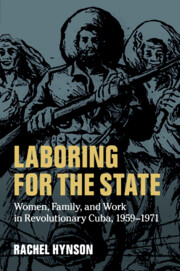Book contents
- Laboring for the State
- Cambridge Latin American Studies
- Laboring for the State
- Copyright page
- Dedication
- Contents
- Figures
- Acknowledgments
- Abbreviations
- Introduction
- 1 In the Hands of Physicians
- 2 “The husband must protect the wife and the latter obey the husband”
- 3 From the Streets to the Home
- 4 The Elasticity of Truth
- Epilogue
- Bibliography
- Index
- Series page
Epilogue
The Erasure and Legacies of Four Early Revolutionary Campaigns
Published online by Cambridge University Press: 09 January 2020
- Laboring for the State
- Cambridge Latin American Studies
- Laboring for the State
- Copyright page
- Dedication
- Contents
- Figures
- Acknowledgments
- Abbreviations
- Introduction
- 1 In the Hands of Physicians
- 2 “The husband must protect the wife and the latter obey the husband”
- 3 From the Streets to the Home
- 4 The Elasticity of Truth
- Epilogue
- Bibliography
- Index
- Series page
Summary
The Epilogue explores the legacies of the state campaigns and shows that the New Family never succeeded in capturing Cubans’ lives and labor. It is for this reason, I suggest, that the Revolution’s official narrative has omitted many of the early campaigns to regulate the Cuban family, specifically women’s labor practices. Yet these silences in the grand narrative reveal how government goals and discourse have transformed over the past sixty years to meet the changing needs of the state. The government explanation for the country’s high rates of abortion and divorce and low rate of official economic productivity is ordinary Cubans’ laziness and lack of commitment to the Revolution. The epilogue argues, on the contrary, that these trends are in fact a direct consequence of government efforts to advance its own version of socialism. Specifically, the very state policies intended to construct the New Family inadvertently contributed to non-nuclear family forms and labor practices. Ordinary Cubans have responded to the discourse of the state with counter-narratives, which frame their non-normative actions as noble and legitimate. Laboring for the State, then, provides evidence of the historical continuity of Cubans’ exercises in autonomy and resistance to the government and its grand narrative.
Keywords
- Type
- Chapter
- Information
- Laboring for the StateWomen, Family, and Work in Revolutionary Cuba, 1959–1971, pp. 257 - 274Publisher: Cambridge University PressPrint publication year: 2020



